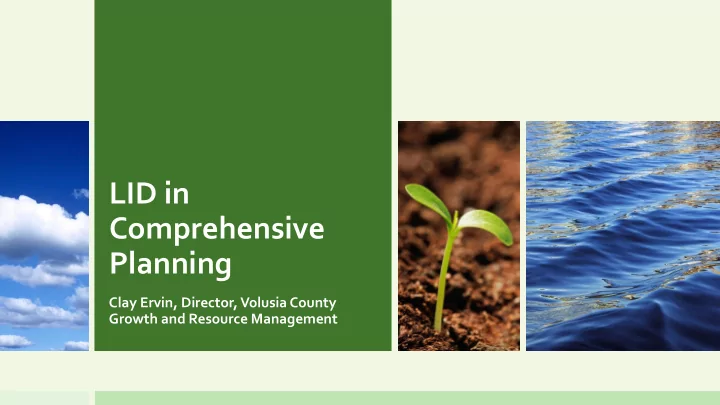

LID in Comprehensive Planning Clay Ervin, Director, Volusia County Growth and Resource Management
LID in Comprehensive Planning • Water Quality and Conservation Policies • Farmton Local Plan • Sustainability Action Plan 2
Part 1: Water Quality and Conservation Policies
CHAPTER 9 DRAINAGE SUB-ELEMENT OVERVIEW • Properly manage stormwater • Protect ground and surface water quality • Protect individuals and prevent property damage from flooding
GOAL: 9.1 Ensure the protection of the surface waters and groundwater for the residents of Volusia County. Best Management Practices (BMPs) for control of erosion and sedimentation shall be employed for all construction, urban development, and agricultural activities in order to protect natural waterbodies, water courses and wetlands from siltation…. (Policy 9.1.2.6)
Chapter 12: Conservation Element GOAL: 12.1 Ensure the protection and improvement of the natural functions and quality of Volusia County's Water Resources. OBJECTIVE: 12.1.1 To prevent the further degradation of the ambient water quality of the County's surface water resources, and to restore to acceptable levels those surface waters which exceed Federal, State and local pollutant standards.
Water Conservation Policy To minimize, and eliminate where reasonably achievable, impacts to ecological communities which degrade their natural physical and biological function as a result of land development activities. (Policy 12.2.2)
Innovative Water Conservation Policies within the Volusia County Comprehensive Plan: • Future Land Use Chapter (maps) • Smart Growth Initiative
LID within the SMART GROWTH INITIATIVE OBJECTIVE SG 1.2: To protect and enhance environmentally sensitive corridors, wildlife habitat, connected wetlands, and natural hydrologic functions throughout Volusia County, the County adopts the Environmental Core Overlay or “ECO” Map as a component of the Future Land Use Map series.
SMART GROWTH INITIATIVE: LID Policies SG 1.2.1: Public lands within ECO shall be managed to protect functioning ecological systems while respecting existing land management or use agreements.
SMART GROWTH INITIATIVE: LID Policies Where a tract of land is partially or fully within ECO, the owner(s) shall be encouraged to: • utilize innovative land planning and development techniques such as conservation subdivisions, rural clusters, rural lands stewardship, • Low Impact Development, Waterwise Development, Firewise Development, United States Green Building Council LEED Certified development, Florida Green Building Coalition designations, or other similar development certifications which promote sustainability.
SMART GROWTH INITIATIVE: LID Policies The County shall encourage landowners who own property within ECO to coordinate development activity and utilize innovative and flexible land development techniques to protect the integrity of the Environmental Core Overlay as an ecological unit.
Part 2: Farmton Local Plan
Farmton Local Plan Goal: … Planning, design, and construction shall meet the highest standards of sustainability as those standards shall evolve over time. Planning, design, and construction shall achieve high levels of energy and water conservation….
Farmton Local Plan Objective 4 Development within the Farmton Local Plan shall promote high standards for water conservation, and energy efficiency.
Farmton Local Plan: LID Policies SDA districts shall promote protection of green infrastructure, natural resource protection, water and energy conservation, and low impact compact development. (Policy 4.1)
Farmton Local Plan: LID Policies Landscape design shall encourage biodiversity using native vegetation with a goal of reducing water usage and treating groundwater. (See Policy 4.2(a)) www.fnps.org/
Farmton Local Plan: Water Neutrality • Water design shall incorporate conservation measures and water reuse so that as nearly as possible it incorporates water neutrality into the construction and operation of the development such that potable water supply would equal water saved through conservation and reuse. (See Policy 4.2 (c)) • ENERGY STAR and Florida Water Stars standards shall be met for all residential development. (Policy 4.6)
Farmton Local Plan: Water Neutrality • Watering of lawns or other landscape areas shall be provided by sources other than potable water. (Policy 4.7) • Waterwise and Florida Friendly principles shall be applied in the design of all landscape areas. (Policy 4.11)
Part 3: Sustainability Action Plan
“Now, more than ever, it is important to balance environmental and economic considerations in our daily operations. A sustainable future for Volusia County, and our entire region, will be based on solutions that include environmental, economic and social considerations.” -Volusia County Council 2012
Sustainability Action Plan (SAP) Goals
Promote a Healthy Community Objectives: Protect and promote an urban tree canopy that improves air quality. • Provide public information describing the benefits of planting additional trees. Minimize the environmental impact of development within the county through sustainable building practices.
Maintain a Healthy Environment Objectives: Expand, protect and restore publicly-owned natural lands. • Continue to manage the conservation lands using a program of professionally accepted principles of resource and ecosystem management. Plan for adaptation to Sea level Rise and dynamic Climate conditions • Incorporate potential sea level rise scenarios into land acquisition, public infrastructure, and land development decisions to ensure the ability to adapt to changing conditions. • Incorporate changing climate conditions into hazard mitigation planning efforts.
Maintain a Healthy Environment Objectives: Manage and protect groundwater and surface water bodies • Promote the use of living shorelines, minimizing the armoring of natural shorelines. • Adopt Low impact development strategies to mitigate flooding from stormwater, capture pollutants prior to release into receiving water bodies, and allow for recharge of our aquifer. • Protect and restore wetlands and salt marshes, which act as natural filters for water quality.
Conserve Water and Promote Water Efficiency Objectives: Develop policies to ensure sustained recharge of the Floridan aquifer and the availability of stormwater for public use. • Support land acquisition in conservation corridors. • Promote the benefits of the land for aquifer recharge. • Promote the use of stormwater/reclaimed water for irrigation (reservoir), and consider ways to allow retention ponds to store reclaimed water. • Encourage Low-impact development (Lid) that uses methods of stormwater treatment closer to the source
Conclusion
Please send examples of LID in your community to greenvolusia@volusia.org to be featured in our next LID workshop on Green Infrastructure September 20, 2018. 33 8/3/2018 Add a footer
Recommend
More recommend